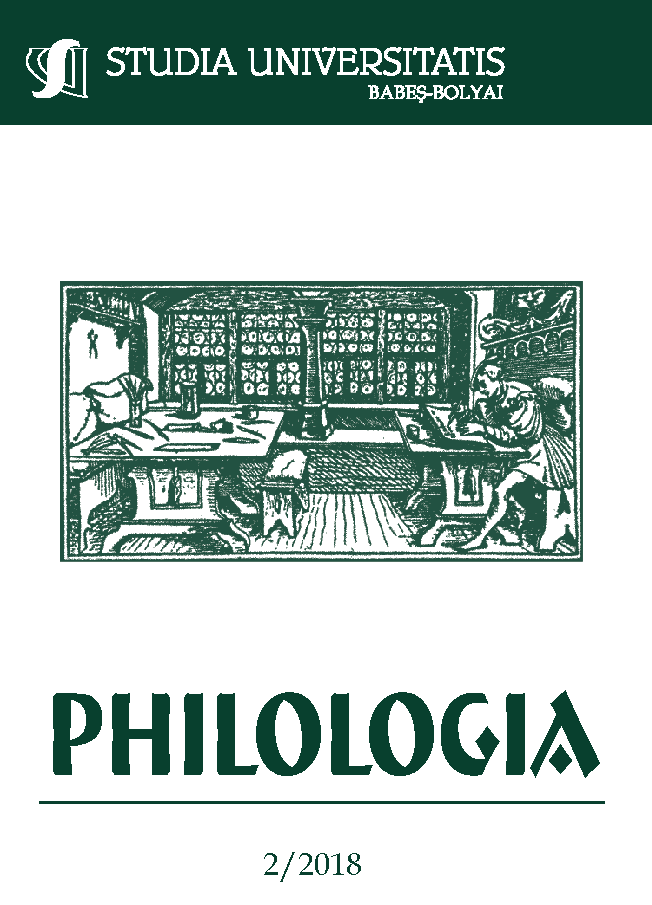"VERBES PARENTHÉTIQUES" ENTRE MARTEAU (GRAMMAIRE) ET ENCLUME (PRAGMATIQUE). QUELQUES REMARQUES SUR UNE ENQUÊTE BILINGUE
DOI:
https://doi.org/10.24193/subbphilo.2018.2.14Keywords:
parenthetical, verbs, transitivity, pragmatics, markers, discourse.Abstract
Parenthetical verbs between the grammatical hammer and the pragmatic anvil: some remarks on a bilingual inquiry. The present paper aims to compare the emergence of a particular class of transitive verbs occurring with a clausal complement via or without a complementizer in two different spoken corpora, one French, the other one Romanian. Called parenthetical verbs, these verbs will reveal, in both languages, that their recurrence is directly dependent on the context, as well as a panoply of discursive effects relying on the nature and on the mobility of a pronominal subject. Finally, we conclude with respect to the relevance of the parenthetical usage with a deleted complementizer to the relation between the main verb and its clausal complement, which is no longer grammatical, but pragmatic.
REZUMAT. Verbe parantetice între ciocan (gramatică) și nicovală (pragmatică). Câteva observații despre o anchetă bilingvă. Prezenta lucrare își propune să compare emergența unei clase particulare de verbe tranzitive care survin cu un complement propozițional via sau în absența unui element subordonator în două corpusuri orale distincte, francez și român. Numite parantetice, aceste verbe vor dovedi, în ambele limbi, o recurență direct dependentă de context, dar și o panoplie de efecte discursive ce se sprijină pe natura și pe mobilitatea unui subiect pronominal. În final, concluzionăm cu privire la relevanța utilizării parantetice cu element subordonator suprimat asupra relației dintre verbul principal și completiva lui, care nu mai este una gramaticală, ci pragmatică.
Cuvinte cheie: parantetice, verbe, tranzitivitate, pragmatică, marcatori, discurs.
References
AUER, P., S. GÜNTHNER, « Die Entstehung von Diskursmarkern im Deutschen – ein Fall von Grammatikalisierung? », in T. Leuschner, T. Mortelmans & S. De Groodt (eds), Grammatikalisierung im Deutschen (Linguistik – Impulse und Tendenzen, 9), Berlin, 2005, pp. 335-362.
BIBER, D. et al., Grammar of spoken and written English, Edinburgh Gate, Pearson Education Limited, Longman, 1999.
BLANCHE-BENVENISTE, C., « Constructions verbales ‘en incise’ et rection faible des verbes », in Recherches sur le français parlé, n°9, 1989, pp. 53-73.
BRINTON, L. J., Pragmatic Markers in English. Grammaticalization and Discourse Functions, Berlin, Mouton de Gruyter, 1996.
CUNIȚA, A., « Modalité et argumentation », in Faits de langue et de discours pour l’expression des modalités dans les langues romanes. Sous la direction de Maria Helena Araujo Carreira, 2015, pp. 35-47.
DEHÉ, N., WICHMANN, A., «Sentence-initial I think (that) and I believe (that). Prosodic evidence for use as main clause, comment clause and discourse marker», in Studies in Language, No. 34, 2010, pp. 36-74.
GOFFMAN, E., Interaction Ritual. Essays on Face-to-Face Behaviour, London, Penguin Books, 1967.
KÄRKKÄINEN, E., Epistemic Stance in English Conversation. A description of its interactional functions with a focus on I think, Amsterdam/ Philadelphia, John Benjamins Publishing Company, 2003.
LANGACKER, R.,W., Investigations in Cognitive Grammar, Cognitive Linguistics Research, (eds.) Geeraerts. D., Dirven, R., Taylor, J., 42, vol. 42, Berlin/ New York, Mouton de Gruyter, 2009.
ÖSTMAN, J.-O., You Know. A discourse-functional study, John Benjamins Publishing Company, 1981.
PETOLA, N., «Comment clauses in present-day English», in Studies in Classical and Modern Philology, Helsinki: Suomalainen, Tiedeakatemia, 1983, pp. 101-113.
POP, L., Espaces discursifs pour une représentation des hétérogénéités discursives, Paris, Editions Peeters Louvain, 2000.
POP, L., « Quelles informations se pragmatisent? », in Revue roumaine de linguistique, Gramaticalizare şi pragmaticalizare în limba română, no 1-2, 2009, pp. 161-172.
ROSS, J. R., «Slifting», in M. Gross, M. Halle, and M. Schutzenberger, (eds.), The Formal Analysis of Natural Language, Mouton, The Hague, 1973.
SCHNEIDER, S., Reduced parenthetical clauses as mitigators. A corpus study of spoken French, Italian and Spanish, Amsterdam- Philadelphia, Benjamins, 2007.
SCHIFFRIN, D. et al., The Handbook of Discourse Analysis, (eds.) Schiffrin, D., Tannen, D., Hamilton, H. E, Massachusetts, Blackwell Publishers, 2001.
THOMPSON, S. A. & MULAC, A., «A Quantitative Perspective on the Grammaticization of Epistemic Parentheticals in English», in Traugott, E. & Heine, B. (eds.) Approaches to Grammaticalization, vol. II, Focus on Types of Grammatical markers, Amsterdam / Philadelphia, 1991, pp. 313-329.
TRAUGOTT, E. C., «On the rise of epistemic meanings in English: An example of subjectification in semantic change», in Language 65, 1989, pp. 31-55.
URMSON, J. O., « Parenthetical verbs », in Mind, n° 61 (244), 1952, pp. 480-496.
Downloads
Published
How to Cite
Issue
Section
License
Copyright (c) 2018 Studia Universitatis Babeș-Bolyai Philologia

This work is licensed under a Creative Commons Attribution-NonCommercial-NoDerivatives 4.0 International License.





 ©Studia Universitatis Babeş-Bolyai Philologia. Published by Babeș-Bolyai University.
©Studia Universitatis Babeş-Bolyai Philologia. Published by Babeș-Bolyai University.